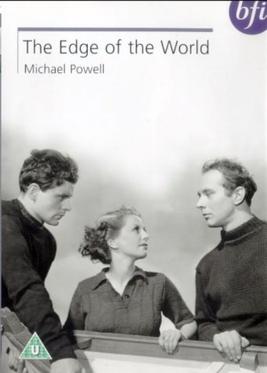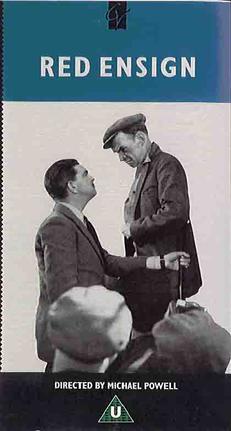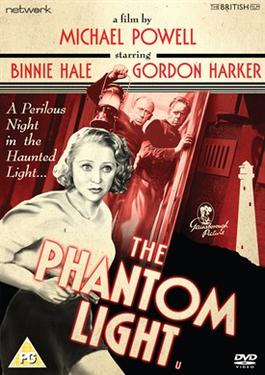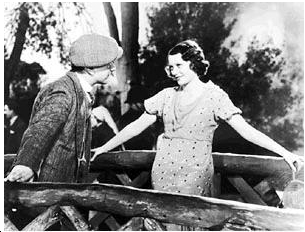
The Edge of the World is a 1937 British film directed by Michael Powell, loosely based on the evacuation of the Scottish archipelago of St Kilda. It was Powell's last major project. The title is a reference to the expression ultima Thule, coined by Virgil.

Red Ensign is a 1934 film directed by British filmmaker Michael Powell. It is an early low-budget "quota quickie".
Reasonable Doubt is a 1936 British comedy film directed by George King starring John Stuart and Nancy Burne. It was produced by the Hungarian Gabriel Pascal.

Man of the Moment is a 1935 British comedy film directed by Monty Banks and starring Douglas Fairbanks Jr., Laura La Plante and Margaret Lockwood. It was made at Teddington Studios by the British subsidiary of Warner Brothers. The film's art direction was by Peter Proud.
Lazybones is a 1935 British film directed by Michael Powell. It was made as a Quota quickie.

The Love Test is a 1935 British romantic comedy film directed by Michael Powell and starring Judy Gunn, Louis Hayward, David Hutcheson, Googie Withers and Thorley Walters. It was made as a Quota quickie.

Crown v. Stevens is a 1936 British crime thriller film directed by Michael Powell. It was made as a quota quickie.

The Church Mouse is a 1934 British comedy film directed by Monty Banks and starring Laura La Plante, Ian Hunter and Edward Chapman. It was made by the British subsidiary of Warner Brothers at the company's Teddington Studios. It was made as a more expensive production than much of the studio's low-budget quota quickie output.

The Phantom Light is a 1935 British crime film, a low-budget "quota quickie" directed by Michael Powell and starring Binnie Hale, Gordon Harker, Donald Calthrop, Milton Rosmer and Ian Hunter. The screenplay concerns criminals who try to scare a new chief lighthouse keeper on the Welsh coast, in an attempt to distract him from their scheme.

The Man Behind the Mask is a 1936 British mystery film directed by Michael Powell and starring Hugh Williams, Jane Baxter, Ronald Ward, Maurice Schwartz, George Merritt, Henry Oscar and Peter Gawthorne. A man assaults and switches places with another at a masked ball, and then attempts a major theft – casting suspicion on the original man.
Hotel Splendide is a 1932 British comedy drama film directed by Michael Powell. It was made as a Quota quickie.

His Lordship is a 1932 British musical comedy film directed by Michael Powell. It was made as a Quota quickie.

The Fire Raisers is a 1934 British drama film directed by Michael Powell. It was described by Powell as "a sort of Warner Brothers newspaper headline story;" and marked the first of his four films with actor Leslie Banks.
Jerome Jackson (1898–1940) was an American film producer and script writer.

Murder at Monte Carlo is a British 1934 mystery crime thriller film directed by Ralph Ince and starring Errol Flynn, Eve Gray, Paul Graetz and Molly Lamont, the production was Flynn's debut film in a lead role in England. The film is currently missing from the BFI National Archive, and is listed as one of the British Film Institute's "75 Most Wanted" lost films.

The Ghost Camera is a 1933 British mystery film directed by Bernard Vorhaus, starring Henry Kendall, Ida Lupino and John Mills, and based on "A Mystery Narrative", a short story by Joseph Jefferson Farjeon.
Don't Get Me Wrong is a 1937 British comedy film co-directed by Arthur B. Woods and Reginald Purdell and starring Max Miller and George E. Stone. It was made at Teddington Studios with sets designed by Peter Proud. The film was made by the British subsidiary of Warner Brothers, made on a considerably higher budget than many of the quota quickies the studios usually produced.
High Finance is a 1933 British drama film directed by George King and starring Gibb McLaughlin and Ida Lupino, which was marketed as "the drama of a man overwhelmed by his own success". It is now classed as a lost film. It was produced and distributed by Warner Brothers and shot at Teddington Studios as a quota quickie.
Brock Williams was a prolific English screenwriter with over 100 films to his credit between 1930 and 1962. He also had a brief directorial career, and later also worked in television. Two of his novels The Earl of Chicago and Uncle Willie and the Bicycle Shop were both adapted into films.
The Black Mask is a 1935 British crime film directed by Ralph Ince and starring Wylie Watson, Aileen Marson and Ellis Irving. It was made at Teddington Studios as a quota quickie by Warner Bros.' British subsidiary. The film's sets were designed by the studio's resident art director Peter Proud. It is now considered a lost film.












